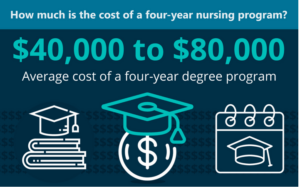Four-Year Bachelor of Science in Nursing (BSN) Programs
 The traditional path to acquiring a Bachelor of Science in Nursing (BSN) spans four years and is open to high school graduates.
The traditional path to acquiring a Bachelor of Science in Nursing (BSN) spans four years and is open to high school graduates.
Continue reading for details regarding the four-year BSN program and the opportunities, requirements, and career paths it offers.
Average Program Length: 4 years
Average Credits Required: 120
Average Earning Potential: $52,080 – $111,220
Source: U.S. Bureau of Labor Statistics / PayScale

Struggling to meet your deadline?
Get your assignment on Four-Year Bachelor of Science in Nursing (BSN) Programs done by certified MDs and PhDs in the USA. ORDER NOW!
Opportunities with a BSN
- Partial online offering: Some schools offer a mix of in-person and online coursework.
- Clinical hours required: Hands-on experience is a key part of the program.
- Good career mobility: Earning a BSN provides opportunities for career advancement and various nursing career paths.
- Most administrative and supervisory positions require a BSN: A BSN is often required for management roles in nursing.
- Path to advancement: A BSN can open doors to nursing specialty careers and leadership roles.
- Grants entry to master’s or doctoral nursing programs: With a BSN, nurses can pursue advanced degrees, which leads to career advancement and higher salaries.
- Job potential: The nursing job opportunities available with a BSN are diverse and include specialized roles outside of bedside nursing, such as nurse educator, nurse practitioner, and nurse administrator.
Skills Learned
Students will gain clinical and leadership skills, case management abilities, and learn to care for both children and adults. Clinical nursing experience is an essential component, offering exposure to real-world nursing situations.
What to Expect from a Traditional BSN Program
While curriculum content and timelines vary by program, the University of Washington’s (UW) BSN program offers a general idea of what students can expect from a traditional, four-year nursing school progression.
Year One
In the first year, students focus on prerequisite coursework. For example, the UW School of Nursing requires 90 quarter credit hours with a minimum GPA of 2.0 in each course. It’s also recommended to gain volunteer experience at a healthcare facility to bolster applications.
Sample Year One Courses:
- English composition
- Mathematics (algebra, precalculus, calculus)
- Nutrition
- Philosophy (practical reasoning or introduction to logic)
- Principles of chemistry
- Statistics
- Survey of physiology and lab
- Arts courses
Year Two
During the second year, students complete their remaining prerequisites and apply to nursing programs. Many programs require tests like the HESI or Test of Essential Academic Skills (TEAS) and letters of recommendation.
Sample Year Two Courses:
- Accelerated calculus
- General chemistry
- Microbiology
- Growth and development through the lifespan
- Literature and medicine
Year Three
In the third year, the curriculum becomes more focused on nursing theory and clinical practice. Clinical hours increase as students apply what they’ve learned in real healthcare settings. Many programs recommend limiting employment during this time due to the intensity of coursework and clinical requirements. We’ve compiled the following course lists from the UW School of Nursing.
Sample Year Three Courses:
- Health assessments
- Healthcare systems and policy
- Pharmacology and pathophysiology
- Community health nursing
Year Four
The final year prepares students for professional practice and the NCLEX-RN exam, which is required to become a registered nurse (RN). Students typically attend classes at least three days a week, with one full clinical day.
Sample Year Four Courses:
- Ambulatory care
- Child health
- Case management
- Informatics and patient safety
- Nursing care of childbearing families
Admission Requirements for a Traditional BSN Program
Requirements may vary, but most traditional BSN programs have the following prerequisites:
- Completed prerequisite coursework
- Minimum 2.5 GPA (often higher for specific courses)
- High school transcripts (and college transcripts, if applicable)
- NCLEX-RN preparation requirements
- Letters of recommendation
- Personal essay outlining academic goals and motivation for nursing
- Volunteer or work experience (50-100 hours)
- Interview with the admissions department
- Resume or CV
Traditional BSN vs. Bridge Programs
In contrast to traditional BSN programs, bridge programs are designed for nurses who already hold an RN license. These programs, such as RN to BSN online programs, can be completed in 18-24 months and allow nurses to earn their BSN while continuing to work.
For nurses with an Associate Degree in Nursing (ADN), the RN to BSN program opens the door to nursing career paths that require a BSN, such as nurse educator, nurse administrator, or even nurse practitioner.
Traditional BSN vs. Accelerated BSN Programs
Accelerated BSN (ABSN) programs are an option for individuals with a non-nursing bachelor’s degree. These programs can be completed in 1-2 years, depending on prior education. Accelerated BSN programs often include both online and in-person learning, as well as clinical experiences.
Featured BSN Specialties
A BSN degree offers various specialty options for registered nurses (RNs) to explore. These specialties may require additional certifications or training but provide exciting career opportunities and specialized roles.
- Requirements: ADN or BSN
- Salary: $73,300
- Job Outlook: 7% growth from 2019-2029
- Requirements: BSN and MSN
- Salary: $116,000
- Job Outlook: 40% growth from 2019-2029
- Requirements: BSN and advanced certifications
- Salary: $80,000
- Job Outlook: Positive growth as demand for nurse educators increases.
- Requirements: BSN and management experience
- Salary: $96,000
- Job Outlook: Steady demand, especially in larger healthcare systems.
- Requirements: ADN or BSN
- Salary: $60,000
- Job Outlook: 7% growth from 2019-2029
Neonatal Nurse
- Requirements: ADN or BSN
- Salary: $60,797
- Job Outlook: 7% growth from 2019-2029
Source: U.S. Bureau of Labor Statistics, PayScale
How Much Will I Make With a BSN?
With a BSN, nurses can expect competitive salaries. Here’s an overview of what you might earn:
- Average Hourly Pay: $32.62
- Average Salary: $85,700
Source: PayScale.com
Why Choose a Traditional BSN Program?
The traditional BSN program offers a comprehensive education that prepares nurses for a wide range of nursing career paths. Whether you’re aiming for a clinical nursing role, a specialty position, or a leadership role such as nurse administrator, a BSN gives you the foundational knowledge and skills you need. Additionally, completing an accredited BSN program ensures that you meet the standards necessary to sit for the NCLEX-RN exam and become a licensed RN.
The BSN program requirements may seem rigorous, but they set you up for a fulfilling career in nursing with strong BSN job prospects, job security, and the opportunity to make a meaningful impact in healthcare.

Dont wait until the last minute.
Provide your requirements and let our native nursing writers deliver your assignments ASAP.


